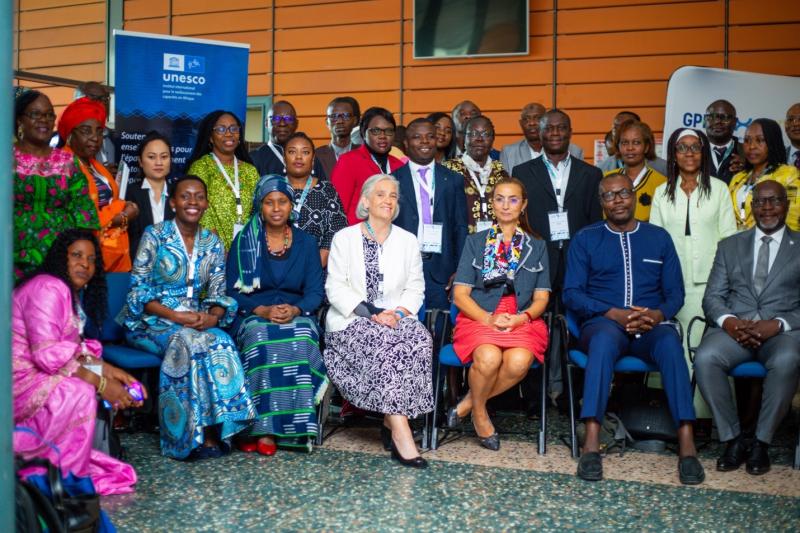
The Second KIX Continental Research Symposium convened over 280 education policymakers, researchers, and practitioners from across Africa. Held from October 3 – 5, 2023 in Abidjan, Côte d'Ivoire, with both in-person and online participation, the event featured plenaries, panels, breakaway sessions, synthesis discussions, and poster presentations, prioritizing gender equity and inclusion in line with GPE KIX’s goals. This blog post summarizes the symposium’s key findings and recommendations.
Researchers, policymakers, and practitioners, representing Ministries of Education, universities, civil society organizations, and multi-national organizations from more than 40 countries in the KIX Africa 19 and KIX Africa 21 Hubs, explored the theme 'Strengthening Data Generation and Analysis for Resilient, Inclusive, and Better Performing Education Systems in Sub-Saharan Africa.’ For three days, they deliberated on innovations in data generation and utilization, policy recommendations, communication strategies, and ways to enhance data processes.
During the reflection sessions held on the third and final day, the researchers and practitioners agreed on several key policy recommendations based on the evidence shared at the symposium. Their insights and recommendations to policy actors are outlined below:
Insights and Recommendations from Researchers
Data Collection and Accessibility
- Develop a coordinated approach to data collection and accessibility among countries. This includes government-generated, researcher-generated, and international think tank-generated data. By harmonizing data collection and ensuring its consistency, accuracy, timeliness, and accessibility, policymakers can have reliable information for decision-making.
- Improve government data by providing more detailed and specific information for evaluating resource allocation is crucial. High-quality data enables policymakers to make informed decisions and allocate resources effectively.
- Create a repository that allows easy access to shared evidence from countries and researchers is instrumental in driving evidence-based policymaking. Consider establishing an open-access Africa-based repository to sustain the knowledge and learning beyond KIX.
Collaboration, Research and Innovation
- Foster collaboration and fruitful meetings between universities and governments. This is essential to break down silos and ensure the effective implementation of research findings. Ministries often overlook the relevance of researchers in shaping policies, but together, they can drive innovation and improve education systems through sharing and using research findings.
- Allocate funds for research, including scholarships and grants. This is vital to encourage and support researchers in pursuing innovative and impactful studies. Adequate funding is crucial for the advancement of education and the development of evidence-based practices.
Inclusive and Equitable Education
- Explore the effectiveness of a bilingual approach in teaching learners, particularly at the primary level. This can lead to improved learning outcomes. By leveraging students' language skills, education can be more inclusive and effective.
- Increase allocation of funds to education, with a focus on rural and hard- to-reach areas. This is crucial to motivate teachers to work in those regions. By addressing resource inequalities, education can become a more equitable and inclusive right for all.
Furthermore, while recognizing the valuable insights gained from the three-day symposium in Abidjan, the KIX Africa 19 Hub focal points, who represent various Ministries of Education (MoE), engaged in further deliberations on enhancing education policies and practices within their respective countries. This involved distilling and synthesizing the most pertinent information gleaned from all three days, and interpreting how these lessons could inform and shape effective education decision-making processes in their departments and ministries. The focal points proposed strategies for integrating research into decision-making, providing a roadmap for policymakers and stakeholders to effectively utilize the wealth of knowledge generated. This reflection session aimed to consolidate and articulate the collective resolve to implement concrete measures and initiatives based on the symposium’s findings, thereby translating knowledge into impactful actions for the advancement of education systems.
Insights and Recommendations from GPE Partner Country Representatives
Several key takeaways and recommendations emerged from GPE partner countries’ experiences during the three days at the symposium. Each of these key takeaways reflects focal points and country representatives’ interests in shaping educational policies and practices in the pursuit of better and more student-centered learning outcomes.
Data-driven Decision Making
- Timely and effective data generation is crucial to informing policy and evidence-based decision-making. Accessible and up-to-date data provides insights into education issues and acts as a foundation for targeted interventions.
- Establishing interconnected data management systems ensures seamless data generation and utilization. By connecting various sources of information, policymakers gain a holistic view of education and can allocate resources efficiently.
- Building capacity in service providers to effectively collect, analyze, and utilize data for decision-making is crucial. Adequate training and support enable stakeholders to make informed choices and optimize education resources.
- Collecting more data on learners with disabilities and other marginalized learners is essential to provide inclusive education services. By understanding their unique needs through comprehensive data, policymakers can allocate resources equitably, identify gaps, and tailor interventions to ensure that disabled and marginalized learners have access to quality education.
Collaborating with Stakeholders on Policymaking
- Fostering collaboration among stakeholders, including policymakers, researchers, and practitioners, is key to better decision-making. By working together, various perspectives and expertise can be harnessed to drive meaningful change in education.
- Involving school leadership in decision-making processes promotes shared responsibility and collaborative approaches to address education challenges. By leveraging the expertise of school leaders, policymakers can learn from the grassroots level and design more consultative policy implementation strategies.
Symposium participants also stressed the need for more regular and efficient communication and information sharing strategies. They emphasized that research findings must be clearly communicated to non-academic audiences, and that governments and researchers should collaborate and engage in dialogue throughout the research process. Such closer collaboration between knowledge creators and decision makers can lead to more targeted, demand-driven research with practical, applicable findings.
In conclusion, the symposium offered valuable insights and recommendations, ranging from teacher job satisfaction to inclusive data collection and collaborative partnerships. The experiences shared by the participants underscores the significance of timely data generation, collaboration with stakeholders, and data driven decision making. These takeaways have the potential to reshape education policies and practices, emphasizing a commitment to transforming knowledge into impactful action within sub-Saharan Africa’s education systems.
